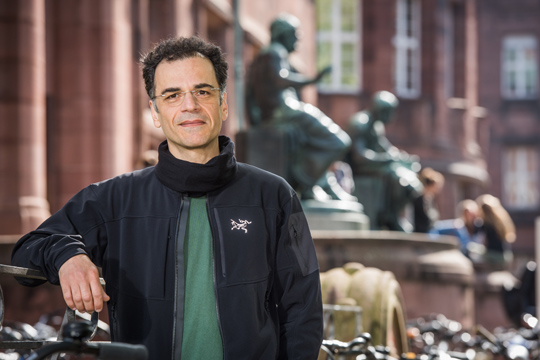When “ne” means “yes”
Freiburg, May 28, 2018
Modern Greek is one of the 24 official languages in the European Union. More than 13 million people speak Greek as their native tongue worldwide, including the Greeks and Cypriots who have emigrated elsewhere. In a series about seldom-learned languages, Christine Hohlbaum talked with the lecturer Michael Nezis about the advantages and the possible misunderstandings of the language.

Michael Nezis grew up in Freiburg in a bilingual household. He works as an area interpreter and language instructor and has worked at the Language Teaching Centre at the University of Freiburg since 2017. Photo: Klaus Polkowski
Mr. Nezis, why is Modern Greek considered one of the seldom-learned languages?
Michael Nezis: The interest in a language increases with the potential to apply it professionally. Greece is no economic superpower – but every year I am happy to see that some people are excited to learn the language.
What are some of the reasons people should learn Greek?
Of course people can get by using English or German in Greece. But if you learn the country’s language, you have a much different, more enriching access to the Greek culture and the people who live there. A shared language can contribute to international understanding.
Which Greek expression should everyone learn?
The customary greetings and polite expressions would be nice. “Jiássas” means both “hello” and “goodbye”, a bit like “Ciao” in Italian. Of course, words such as “parakaló” (please) and “efcharistó” (thank you) are important too. It would also be good to know words such as “fajita” (food) and “tualéta” (bathroom).
What is your favorite word?
That depends on my mood. Beautiful words such as “agápi” (love) and “thálassa” (ocean) are good examples.
What “false friend” should people look out for in Greek?
If you order “mia bira” (a beer) in a tavern and the waiter says “ne,” you need not be concerned that he won’t bring you your drink. “Ne” means “yes” in Greek. “Apothíki” is not the place to buy medicine, but rather a shed where spades and shovels might be found. “Trápeza” is definitely not equipment you would see in a circus, but rather a financial institution. “Chína” is not the most populous country in the world, but rather a goose. And let’s not forget the word “serviéta” (sanitary napkin), which should not be confused with a dining napkin.
Which Greek expression do you miss in German?
There is no satisfactory equivalent for the word “filótimos” in German. It means something along the lines of “gentleman” in terms of friendliness, honor and helpfulness. But there are also words in German for which I have also not found a German equivalent, such as “to hiss”. My Greek friends say “chhhhh” instead. I have yet to find a satisfactory Greek term for it.
Which Greek word best describes the University of Freiburg and what does it mean?
I associate the University with the word “agora,” a place where, apart from the exchange of goods, ideas and viewpoints were exchanged and political opinions collided.
Language Teaching Centre
The Language Teaching Centre (SLI) at the University of Freiburg offers courses in more than 20 languages that are open to all students, staff and University guests along with the general public.
Course offerings and registration

